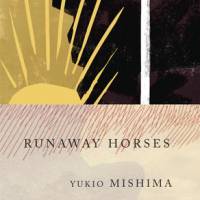First published in 1969, "Runaway Horses" is considered by some to be the best Japanese novel of all times. With stunning lyricism and philosophical depth, it shows Yukio Mishima at the peak of his artistry.
Runaway Horses, by Yukio Mishima, Translated by Michael Gallagher.
432 pages
VINTAGE INTERNATIONAL, Fiction.
Set in 1932, the story follows the aging Osaka judge Shigekuni Honda as he befriends Isao Iinuma, a young kendo talent obsessed with a group of revolutionaries, The League of the Divine Wind. Like his martyred heroes, Iinuma gathers a band of assassins to lash out against financial elites and corrupt government officials. With steely resolve and the help of a right-wing lieutenant, he aims to restore the honor of the Emperor and stop "the poison spewed out by the factory of Western European ideals."
Mishima uses Iinuma as a stand-in, the novel as a rehearsal for the coup he later attempted in real life. But the politics are unimpassioned, a mere afterthought. Iinuma himself calls his small-time play at revolution "an act that will probably amount to nothing at all." His main wish is death as a path to purification, an exit to bestow immortality on a narcissist.
Mishima's demons are out in full force: the tortured masculinity and contempt for a weak Japan, as well as his yearning for youth and beauty — the spiritual consequence he wouldn't forego as he aged. "Perfect purity is possible," Mishima writes, "if you turn your life into a line of poetry written with a splash of death." This hauntingly beautiful novel may make the point better than the author's own suicide.
Read archived reviews of Japanese classics at jtimes.jp/essential.


















With your current subscription plan you can comment on stories. However, before writing your first comment, please create a display name in the Profile section of your subscriber account page.